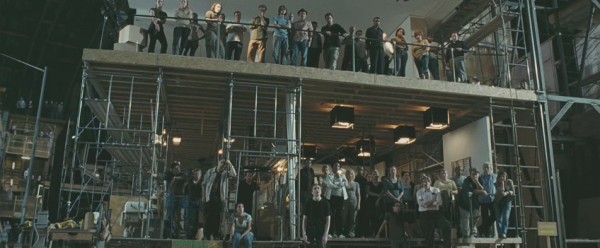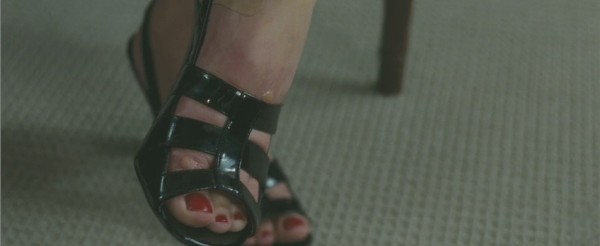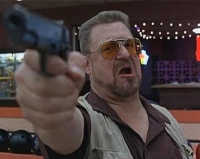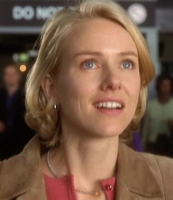Scrubbing Out the Dead
2009 // USA // Christine Jeffs // April 11, 2009 // Theatrical Print
C+ - Christine Jeffs' Sunshine Cleaning lounges comfortably within the plush confines of the indie dramedy framework, but it mostly resists the roteness and simple-minded platitudes that usually bedevil the genre. It's apparent from the first scene that we are not traipsing through feel-good territory: an anonymous man walks into an Albuquerque sporting goods store and proceeds to blow his head off with a shotgun. However, another early scene more gracefully signals Sunshine's modestly sophisticated approach to the well-traveled premise, Spunky Protagonist Discovers Her True Purpose. House-cleaner and single mom Rose (Amy Adams) stands in her bathroom, still dripping from a shower, and reads aloud from a note taped to the mirror: "You are powerful. You can do anything." It's an intriguing gesture that reveals a woman both more vulnerable and self-aware than one might expect of a film like Sunshine. (There is even a gentle echo when a character later discovers a poignant reminder note posted on a door.) And so it goes: Jeffs begins with a story that seems dully familiar, but adds sufficient half-twists to fashion something far more satisfying than might have otherwise emerged. Often these are omissions that intrigue by their absence and add dollops of authenticity to the film's quirky form. Jeffs shaves off bits and pieces here, skips over the unnecessary there, and generally keeps the viewer on their toes while also ensuring they leave their seat pleased as punch.
Sunshine's starting point is a factory-model grab-bag of characters with oddball attributes and a plethora of personal demons. Rose is our heroine, a skinny working mom with fear and weariness behind her pixie eyes, not to mention a married high school sweetheart (Steve Zahn) she can't quit. Her young son, Oscar (Jason Spevack), is clever, troubled, and constantly getting into things he shouldn't. Rose's sister, Norah (Emily Blunt), is a habitual fuckup with a waspish tongue and a heaping helping of confusion about her identity. Norah lives with their father, Joe (Alan Arkin), a widower who is perpetually embroiled in ill-advised get-rich-quick schemes.
If you guessed that Sunshine Cleaning is, at bottom, about how these characters learn a little about themselves, survive a calamity or two, and make some positive changes in their lives... well, you'd be pretty much on the nose. What makes the film a bit more intriguing than most indie fare that operates in this mode is the way that Jeffs and screenwriter Megan Holley (in an impressive debut) keep things just a little off-kilter. The beats don't arrive at exactly the expected places, which gives the proceedings an odd tinting of genuineness, a valuable thing when so much about the film otherwise feels so calculated and gratingly Sundance-friendly.
Example: Rose eventually tumbles to the fact that her flame, Mac, who happens to be a plainclothes Albuquerque cop, will never leave his wife and children. She breaks their affair off, in a sad, awkward little scene that plays out in her front doorway. In another film, this scene might have appeared at the conclusion, but Holley places it between the second and third acts. There's a pleasing intelligence at work in that decision, as dragging Mac along into the film's climactic events would be needlessly complex and a diversion from Rose's more fundamental problems. Yet Sunshine also gives us a taste of the lingering pain when Rose runs into him at a crime scene later on. There's no explosive confrontation, just rueful and wounded glances. This sort of storytelling grace is refreshing, as is Sunshine's resolve to let some aspects of its narrative dangle a little. Not everything happens on screen, not every question is answered, and not every subplot is followed through to a tidy little conclusion. It's a testament to Jeffs' skill that the result doesn't seem tattered, but instead limber and confident.
Ah, but now I realize I haven't even talked about the plot. Primarily it revolves around Rose's decision, prompted by a suggestion from Mac, to start a crime scene cleanup business. Perhaps unwisely, Rose takes her undependable sister in as a partner, but she also curries favor with the quiet, obliging owner of a janitorial supply store (Clifton Collins, Jr.). As might be expected, Rose and Norah's struggles with the unfamiliar realms of biohazard disposal are played for pathos and mildly black humor. And wouldn't you know it that both sisters are haunted by their mother's suicide, and much of the familial tension stems from this trauma? The story isn't awful or anything, or even that uninspired, but it does seem suspiciously cute as a button, while the morbid aspects of the film often verge on tastelessly manipulative.
Still, Sunshine's performances are sufficiently strong—not great, but pleasantly seamless—to lend the film emotional credibility. And, again, Jeffs knows how to shake things up, almost as if she is straining against the very conventions she has enthusiastically embraced. There are a lot of story elements that remain veiled, when they could have been deployed as pellets of crass melodrama. We hear nary a peep about Oscar's biological father, or about why, exactly, Rose and Norah's mother killed herself. Oscar asks Collins' shopkeep about his amputated arm, but he never asks how the man lost his limb. Curiously, none of this is unsatisfying, but rather sort of stimulating. One gets the sense that Jeffs isn't talking down to us, even if she is telling a story that we know pretty well. Ultimately, there's nothing extraordinary about Sunshine Cleaning, unexpectedly sharp through it may be. It fulfills its promise, evincing an unwarranted reverence for a stale form even as it grooves engagingly within the confines of that form.




















